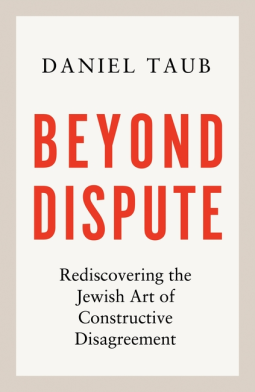Beyond Dispute
Rediscovering the Jewish art of constructive disagreement
by Daniel Taub
You must sign in to see if this title is available for request. Sign In or Register Now
Send NetGalley books directly to your Kindle or Kindle app
1
To read on a Kindle or Kindle app, please add kindle@netgalley.com as an approved email address to receive files in your Amazon account. Click here for step-by-step instructions.
2
Also find your Kindle email address within your Amazon account, and enter it here.
Pub Date May 22 2025 | Archive Date Jun 18 2025
John Murray Press | Hodder & Stoughton
Talking about this book? Use #BeyondDispute #NetGalley. More hashtag tips!
Description
Fiercely divisive times call for radically different arguments.
In our age of seemingly irreconcilable differences, argument is increasingly seen as a plague to be avoided or a contest to be won. Daniel Taub, an experienced peace negotiator and diplomat, argues that ancient Jewish wisdom offers a third way. Drawing from this tradition, and from his own experience at the heart of some of the world's toughest negotiations, in Beyond Dispute he makes the case for a radically different approach to help us come closer to truth and to each other.
This approach sees argument not as a combat zone but as a joint enterprise, and its disputants not as jealous custodians of competing truths, but collaborative explorers. It seeks to create safe spaces not by outlawing controversial opinions but by welcoming them, and it offers a set of practical tools to rethink our own preconceptions. In fractious times it charts a way to build communities and societies that are resilient enough to face new and challenging ideas without fear.
Weaving ancient insights with contemporary research in conflict resolution, as well as behind-the-scenes personal stories of diplomacy and negotiations, Beyond Dispute is a passionate call to rediscover and harness the vital and surprising power of a good argument.
Advance Praise
"Combining deep knowledge of Jewish tradition with decades of experience as a senior diplomat, Daniel Taub has written a book that is erudite, insightful and unexpectedly hopeful. With its understanding of the power of story to touch the places logic alone cannot reach, it offers an approach to conflict - whether between nations or within a family - that is both readable and practical. It's part Malcolm Gladwell, part Talmudic essay and completely compelling."
Jonathan Freedland, author of The Escape Artist: The Man Who Broke Out of Auschwitz to Warn the World
Available Editions
| EDITION | Other Format |
| ISBN | 9781399815062 |
| PRICE | £25.00 (GBP) |
| PAGES | 272 |
Available on NetGalley
Featured Reviews
Can we still have constructive debates in an era of emotional arguments that feel like a battle to be won?
Daniel Taub has managed to explain the problem of our current times perfectly. With the rise of Twitter and internet arguments, we seem to have lost the ability to listen and replaced it with an idea that disagreements should be won at all cost. ‘Few things have effectively done more harm than the belief on the part of individuals or groups that they are in sole possession of the truth.’
However not all is lost as he also comes up with a solution.
He uses his experience working as a negotiator during some of the most turbulent times in modern Israel’s history to explain how, even when a situation seems impossible, an agreement can be reached. All we need is to open our ears to the other side, listen and try and understand their point of view, and above all we should learn again that it is ok to not know everything.
This also comes with the issue of bias as we selectively choose which information we deem trustworthy based on our own formed opinion. ‘One significant finding of this research is that the more years of education one has had, the more likely one is to be susceptible to confirmation bias, and to subconsciously edit the facts available to suit our preconceptions.’
All of his points are explained by examples from the Talmud and the Torah, as well as his real life experiences. Don’t be surprised, this book contains a lot of Jewish teachings but it is all well explained.
It is a book I would recommend to anyone alive today. After all, if James O’Brien could realise his stance is not always the correct one, so can anybody else in the world.
At a time when most debates feel more like combat than conversation, Beyond Dispute lands as a deeply relevant and refreshingly hopeful invitation to rediscover the lost craft of argument. Drawing from Jewish tradition—especially the Talmud’s reverence for respectful dissent—as well as his own experience in diplomacy, Daniel Taub makes a compelling case: disagreement isn't a threat to avoid or a weapon to wield, but a vital practice to approach with humility and care.
Coming from a Jewish background myself, and having spent much of my career in the legal world where argument is both a tool and an art form, this book struck a deeply personal chord. Taub’s reminder that real argument isn't about defeating someone, but about understanding them felt both timely and profound. The Jewish tradition’s long-standing embrace of many voices and differing views resonates strongly, and Taub does an exceptional job showing how those values can still guide us in today’s increasingly fragile public conversations.
The book flows with warmth and clarity, blending ancient teachings, lessons from real-life negotiations, and modern social science. Taub’s voice throughout is steady and thoughtful, never preaching, always encouraging conversation. He writes the way he wants us to speak: with care, curiosity, and respect.
This isn’t just for scholars, or folks in politics or diplomacy—it’s for anyone who’s tired of the shouting and the silencing, and who’s searching for a more generous way to talk and to listen. In that sense, Beyond Dispute isn’t just a timely read. It’s an essential one.




